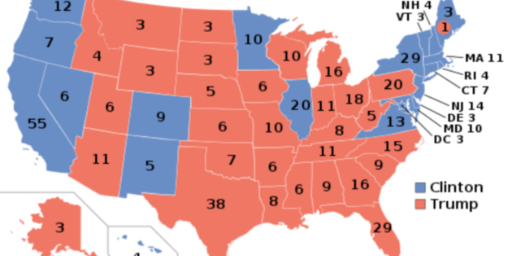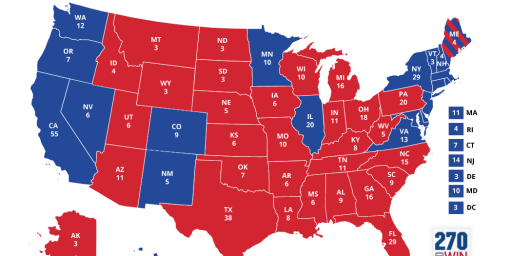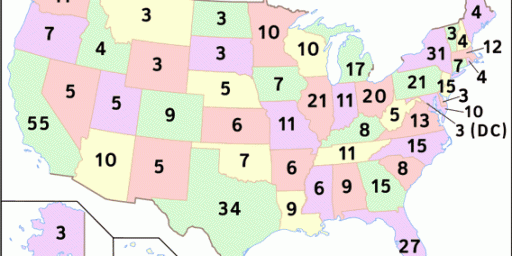Reforming the EC is not the Same as Overturning it
Wherein I respond to a ridiculous comparison.

In passing over the weekend (perhaps in an open forum?), the following by Andrew McCarthy, writing for Fox News, came to my attention: Before Trump’s complaints, Democrats promoted radical plan to alter presidential elections. It is a truly absurd equating of the National Popular Vote Interstate Compact idea and Trump’s attempt at disenfranchising whole states.
The premise is as follows:
The people of the states of Pennsylvania, Michigan, Wisconsin, Georgia, and elsewhere have spoken. By majority vote, they have chosen Joe Biden over Donald Trump. Isn’t it outrageous to suggest that the vote of the people of those states should be cast for someone other than the candidate preferred by the millions of voters in these states?
Well, yes, it is.
[…]
But let’s not pretend that Trump is the first to promote the radical, politicized notion that the candidate who wins a state’s election should not get that state’s electoral votes.
Progressives beat him to it, long ago.
As we discussed back in July, a growing group of states dominated by left-wing Democrats has for years been cobbling together the so-called National Popular Vote Interstate Compact (NPVIC). The compact’s member states agree that they will award their state’s electoral votes not to the candidate who won the state’s popular election but to whichever candidate won the popular vote nationwide.
This is a reprehensible attempt at equivalency. Yes, both are about using the constitutional power of states to appoint electors, but one (Trump’s) is about literally disenfranchising American voters on a mass scale while the other (NPVIC) is about making all American voters count equally.
If you think those two things sound the least bit the same you have a profound comprehension problem.
Let’s break this down just in case.
When Trump and his allies have made suggestions about state legislatures appointing an alternate slate of electors that are asking for a post hoc changing of the law so that pro-Trump electors would be allowed to vote in the Electoral College instead of the electors chosen by the voters in the states in question as state laws currently require.
Once more for effect: the disenfranchising millions of voters because the election did not turn out the way Trump wanted.
Now, to be clear, McCarthy is not supporting that move. But, he is suggesting that that attempt is equivalent to the NPVIC.
That. Is. Absurd.
Regardless of one’s views on the NPVIC, the goal is in direct opposition to Trump’s goals. The baseline idea of the NPVIC is that the states would award their electoral votes to the candidate who won the national popular vote. It is a way, in theory, to use the fact that the US constitution gives the power to select electoral to the state legislators to then allow the president to be selected on the basis of the national popular vote (and not 51 separate contests to select electors).
Put another way: a state’s electors would be awarded to the winner of the national popular vote regardless of the way the state voted. It is an interstate compact because to work it requires states that sum to at least 270 EVs to be signatories for the plan to work.
The biggest obstacle is getting enough states to get to that threshold. The second obstacle is that Congress has a role in interstate compacts, and Republicans in the Congress would likely be opposed.
But back to the equivalence issue:
Trump wants an ex post facto change of the rules because he lost and he wants to invalid millions of votes to do so.
NPVIC advocates want a reform that would be in place before an election that would guarantee that all American voters are treated equally.
To quote Sesame Street: one of these things is not like the other.
It is utterly maddening for McCarthy to try and “both sides” Trump’s blatant attempt to overturn an election by comparing it to a reform explicitly based on democratic fairness.
After having manufactured this massive false equivalency, he then launches into some of the Greatest Hits of EC Defenders.
First,
This would radically change the way we’ve conducted presidential elections, inducing candidates to ignore much of the country and concentrate their campaigns in urban population centers — dramatically increasing the influence of progressives over the nomination of candidates and the campaign debate over policy.
First, the EC currently does not, in any way, increase the attention paid by candidates to the various states. Indeed, it just gets them to focus attention on swing states. See this post of mine from earlier this year. The evidence is quite clear.
Second, the notion that candidates would focus on “population centers” would be a heckuva lot better than just focusing on swing states. This is because “population centers” are full of, you guessed it, people! People are what matter. Further, there are lots of people of various ideological perspectives in those places. Millions of people in California voted for Trump, but he got zero electoral votes from CA. CA Republicans don’t matter. How is this defensible?
What the NPVIC would do is “dramatically increase” the equality of the voters of all citizens and require presidential candidates to have to appeal to a majority of the country.
What a concept!
Most significantly for present purposes, the NPVIC would substitute the preferences of political operators for the solemn choice of the people they represent. In 2004, for example, it would have required casting California’s 55 electoral votes for George W. Bush, even though John Kerry won the state by 1.2 million.
More accurately, the electors would be voting for the “solemn choice of the people” of the United States, rather than of a singular state. In other words, the NPVIC would change the electors’ duties to reflect the actual choice of the country.
And yes: in 2004 CA’s electors would have voted for Bush because, you know, he got the most votes across the country in that election.
Again, what a concept!
Side note: it is worth noting that McCarthy has to go back to 2004 to find an example of a Democratic state having to vote for a Republican under an NPVIC scenario because that was the last time the GOP won the national popular vote (his next example would have to be 1988). And we get to the real reason he is uninterested in reform, I suspect.






And that, ultimately, feels like a feature rather than a bug.
First a state ratifies the vote in their state, and then that state acknowledges and accepts the national vote.
@Gustopher: Exactly.
He is also implying that the Interstate Compact is fundamentally a Democratic or even “left-wing” project. I watched an entire video interview with a member of the Compact, and he was a Republican who went on to make a fairly conservative case for it. The Compact was started in 2005, which was right after an election where it appeared that the EC was more of a benefit to the Dems than the GOP, as John Kerry came fairly close to winning the EC (a shift of less than 2% of the vote in Ohio would have done it), despite losing the popular vote by a wider margin.
Of course, it is true that Dems today are in general more in favor of the Compact than Repubs, and that can be explained at least in part in terms of the partisan incentives, given that the Dems lost the White House twice in the past two decades while winning the popular vote. But the simple fact is that the idea of the Compact (and the broader notion of moving toward a national popular vote) is not intrinsically a “liberal” or “conservative” idea.
That’s the problem. Options imply choice. They’ll take the easy win of a “safe” state rather than have to reach out and explain why people should choose them.
Because CA and NY Republicans aren’t “real” Republicans, Steven. They’re spoiled by living in a blue state and have certain expectations red states just don’t meet. That’s why whenever conservatives flee Commiefornia they end up bringing their heathen liberal ways and piss off the locals. Sure, they may be pro-2A and hate abortion and think schools are full of indoctrination but they still expect there to be good schools and social services and functioning government. Infrastructure that’s not falling apart or just plain missing like high-speed internet or more than one hospital per 100 miles. Thus they make demands of the government and who’s gonna pay for all that? Closet liberals, trying to ruin God’s country and urbanize with their fancy coffee loving ways!!!
CA and NY Republicans are not the same as their Southern or Midwestern cousins. The GOP can safely ignore them because they’ll be taken care of as part of being a blue state – they don’t have to deliver on promises because the liberals will. It’s the red states where they have control and actually need to pay up that will always get the attention, even if we abolish the EC.
The size of the House needs to be expanded. The EC would still function as it did before, but the parity between small states and large states would go away. Not letting the House keep up with population growth creates large unintended (well, maybe a little bit intended) consequences with regard to our constitutional system.
The NPVIC, if enacted would likely be found unconstitutional, particularly with the current SC. If it were enacted and survived a challenge, expect outrage and a repeal attempt in any state whose electors vote for the popular vote winner rather than who the state’s voters supported.
@Console: is right the only way to reform the EC is by expanding the House and by admitting DC and PR as state.
But yes, Andrew McCarthy is a fool.
Or a conservative, but I repeat myself. You say the EC disenfranchises voters. A conservative would say the NPVIC would disenfranchise voters, real ‘murcan in the heartland voters.
I like the NPVIC in principle, but I fear future congresses and current and future Supreme courts would screw with it if they didn’t like the outcome. IANAL but I suspect that increasing the size of the House as @Console: says, and you’ve pushed, Dr. T, would get us a long way to the desired result and be less prone to reversal. As would statehood for DC and PR. However, no reform seems possible if Moscow Mitch retains his post as Majority Leader. And even with Majority Leader Schumer, the Supremes would block anything. Unless a reform had huge popular support, which I also don’t see happening in the age of FOX and OAN.
Ultimately, the United States needs to recognize that it is a single country, rather than 50 countries affiliated in a confederation. And that has been true since 1788 when the Constitution was ratified and supplanted the articles of Confederation.
As to false equivalences, and I agree that’s what it is, imagine a law that says: the State’s electors shall be awarded to the winner of the popular vote within the State, except if said winner happens to be of the wrong party; in this case the State’s electors shall be assigned to the candidate representing the Democratic party, regardless of the popular vote totals within the State.
The above is the kind of law a blue state would have to pass to be equal to trump’s attempt to steal the election.
Not to mention the one near-universal legal principle is that the law is not retroactive. People voted in the 2020 election under a set of laws and rules on how their votes would be counted. Changing it after the fact negates this, and makes for a retroactive law.
BTW, if the Popular Vote Compact were adopted, and it passed Congress and the courts, then we’d see massive disenfranchisement of black and other minority voters in red states. That would be the last and only way for the GOP to retain power.
@Console: I 100% support expanding the House. And yes, expanding the House would lessen the negative effects of the EC. But, to be clear, it wouldn’t fix them or make them go entirely away.
@Sleeping Dog: While it is impossible to entirely predict such things, I think that if the NPVIC was signed and ratified by the Congress (as per the constitution), I don’t know what the grounds would be to challenge it in court in a way that would allow SCOTUS to scuttle it. But, I suppose that is a possible outcome.
He also has the gall to write the following:
It would also be far easier to manipulate a single election by fraud than 50 state elections. We would thus lose the advantage of diffusion, which has been touted as our greatest defense against foreign interference (of the kind alleged by Democrats in 2016) and massive fraud conspiracies (of the kind alleged by some Trump supporters in 2020).
The EC makes foreign interference (as in 2016) and fraud conspiracies (as in 2020) effective because it creates a handful of tipping point states that determine the outcome of the election. Hillary won the popular vote by 3,000,000 and Biden by 7,000,000, outcomes that are far beyond any threshold that would make popular vote shenanigans determinative.
All these people have are lame arguments.
That’s as far as you need to read in McCarthy’s “analysis” to know that it’s pure propaganda. There are hardly any “left-wing Democrats” left, and they do not dominate any state or group of states.
Republicans do need their boogey men to frighten the children with, though…
@Paine:
Of late I’ve seen a lot of arguments that boil down to, “Lining up on Tuesday to vote was good enough for my granddaddy and ought to be good enough for these whippersnappers.” I figure it would be pointless to mention that nobody asked granddaddy for a photo ID at the polling place.
@Paine: @DrDaveT: The piece, brief as it is, is rife with points to criticize. I ran out of time to address them all.
Interesting post and analysis.
And full-disclosure: I’ve long been a fan of the NPVIC and voted for it on the ballot here in Colorado last month. I think it is an interesting and useful experiment in many ways although I think it is very likely to fail for reasons that should be obvious that I touch on below.
In a broad sense, I agree with the general thrust of your post, but would make the following observations:
– There’s a difference between intentions and process. I do think the intentions between what Trump’s allies are doing compared to the intended goal for the NPVIC is very, very different. On process, however, I think they are closer. Both rely on the notional mechanism that states have the power to choose electors independent of what the voters in that state actually want. Anyone who believes that states have this power should be cognizant that the blade has two edges.
– The NPVIC is not “reform” in any real sense. It does nothing to change the actual system. Instead, it is an end-run, a hack, or even an exploit that is specifically designed to use one of the more unusual and little-known forms of federalism in our country to effectively change the Constitution without going through the normal process. That the ultimate goal is much nobler than what Trump is doing does not change the fact that the method is constitutionally questionable.
For all its good intentions, the NPVIC has some significant problems:
– Congress and the courts have oversight of interstate compacts and a compact that is specifically designed to change a constitutional process as important as the election of the President is – and should – get a lot of scrutiny. The idea that a handful of states can unilaterally redefine the criteria for electing the President is a pretty tough hill to climb.
– Compacts are not suicide pacts. Another reason this isn’t a real reform is that a state could opt to leave the compact at any time. A state could conceivably choose to change its mind near or even after an election assuming the legislature has the power to do so (here in Colorado the NPVIC is now part of the state constitution, so that wouldn’t be possible without another referendum). Given the political stakes of Presidential elections, the danger of that actually happening are not trivial. That would create unprecedented issues of legitimacy which would need to be settled by the courts. It’s certainly conceivable that the NPVIC could end up being worse than the disease.
– It’s not majoritarian. These changes in how some states will allocate EV’s will be the result of votes from a minority of voting Americans unless a super-majority of states join the compact. Even here in Colorado, only 52% voted for the amendment. In many other states, there hasn’t been a popular referendum at all, merely a law passed by the legislature.
– As I repeat here endlessly, process matters. A process isn’t noble simply because it’s a means to achieving one’s desired goals. The reality is that if a process can be used for one thing, it very likely can be used for other things. In this case, one should consider the consequences should an interstate compact be successful in de facto changing the Constitution in terms of how that tool might be applied to other parts of the Constitution. This obviously speaks to the balance between federal and state power and where the line should be drawn with respect to federalism. If the NPVIC is successful and survives the challenges then that will be a huge change to that balance which is – at best- unpredictable in terms of long-term consequences. And when it comes to political systems and stability, uncertainty always carries a lot of risks. Related to that, are the potential consequences of a state legislature’s ability to allocate EV’s based on criteria besides what the people in that state voted for.
Despite these concerns, I think the NVPVIC is a useful experiment that should be allowed to play out, but I am very skeptical that it will succeed.
I’ve been following the NPVIC for some time, and there are precious few valid arguments against it. Rather, it’s clear that most Republicans oppose it simply because they think it would help Democrats.
Now, granted, I think it would, but I think it’s easy to make a case for why a popular vote is in the interest not only of the country as a whole, but of conservatives in particular. I’ve seen Coloradans bemoan the fact that they’re no longer a swing state, so neither campaign bothered visiting them or addressing their concerns. They miss the attention.
@Andy: Don’t get me wrong, I am not an uncritical cheerleader for the NPVIC. I have come to support it as the only possible pathway to change an institution that is increasingly a major problem. And I am quite skeptical about its chances for success for a variety of reasons.